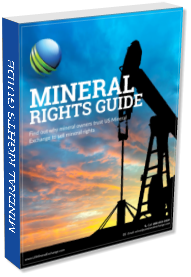
Force Majeure Impacting Mineral Owners
Have you received a letter from an oil and gas operator requesting a Cessation of Production Waiver or a notice of an operators need to shut in wells due to Force Majeure? This article is going to help you understand what these two types of notices are and what they may mean to you.
The global pandemic caused by COVID-19 has many mineral and royalty owners concerned about the impact of Coronavirus on their royalty income. With governments around the world declaring states of emergencies due to the pandemic, the oil market has seen a drastic drop in the price of crude oil and a significant decrease in the demand for it. As a result, many operators are shutting in their wells until things change. Here are the two most common types of letters we are seeing from operators and the impact to a mineral and royalty owner:

FREE GUIDE
Download our free mineral rights guide now! Learn more about your mineral rights.

Garrett Phelan
CEO of US Mineral Exchange with over 27 years of experience in the oil and gas industry. For nearly two decades, he has helped individuals, families, trusts, and non-profits navigate the complexities of mineral and royalty rights to achieve the highest sale prices.
Widely recognized as an industry expert, with an unwavering commitment to a client-first philosophy and extensive industry knowledge, he has been featured in Hart Energy, Yahoo Finance, and the Permian Basin Petroleum Association magazine.
Force Majeure Clauses
Force Majeure – According to Legal Information Institute, Force Majeure is a contract provision that frees parties from obligation to each other if an extraordinary event prevents either party of an Agreement, in this case the Oil and Gas Lease Agreement, from performing. The event must be unforeseeable and unavoidable.
Royalty owners are beginning to receive letters from operators citing force majeure as a reason operators need to stop production on wells. In short, the operator is putting mineral and royalty owners on notice that they should not expect to receive any more royalty checks until the situation improves.
But what is Force Majeure? In most force majeure cases, the operators are telling mineral and royalty owners that they are no longer able to sell their oil. With most of the world in some form of a lockdown or stay at home order, no one driving and no one flying, demand for oil (gasoline, diesel fuel, jet fuel etc…) has come to a screeching halt. The result is a huge amount of oil flooding a market with a limited amount of room to store it.
What normally happens when a barrel of oil is produced from the ground is it is sold at the well by the operator to a purchaser of oil. A purchaser of oil is different than an operator in that the purchaser is solely in the business of buying crude oil. They have nothing to do with drilling for oil or how the oil comes out of the ground. The purchaser is only interested in buying the oil after it leaves the ground. Once a purchaser buys oil from the operator, they will then move the crude oil by either truck or by pipeline to a refinery where the crude oil is then refined into various products like gasoline, diesel fuel, and jet fuel for consumer use.
However, with the global shutdowns and no demand for fuel, the oil storage tanks are getting full and as a result, the purchaser is telling the operator who generates your royalty income, they can no longer buy the oil. They have no more room to hold any more oil. If no one is willing or able to buy the oil from the operator, the operator must stop pulling the oil out of the ground and as a result, no income is generated from the sale of oil and no income can be paid out to royalty owners any longer.
Cessation of Production Clauses
Cessation of Production – We are also seeing letters from operators invoking Cessation of Production clauses. Cessation is defined a temporary or final ceasing of an action. Normally, a Cessation of Production is final in the oil and gas industry. An example would be when an oil and gas well no longer generates enough revenue to cover the costs to operate it. If it costs more to operate the well than the revenue it generates, an operator will no longer produce the well. The operator will then “shut in the well” and the lease will expire, leaving a mineral owner the option to lease the mineral rights again at some point in the future. However, when there is only a temporary cessation of production, the owner may not lease the mineral rights to anyone else. They simply stop receiving income until the operator starts producing the well again. Some common examples of this are when the operator shuts in a well temporarily to rework it in the hopes of generating more oil or gas in the future. The operator may also shut in a well temporarily to fix a problem that is keeping the well from functioning as it should. These improvements or repairs are usually 120 days or less and avoid the termination of the lease. The operator is entitled to a reasonable time to make repairs and get the well going again.
With that said, the Cessation of Production letters going out related to Covid-19 are new territory. In some ways, they are related to the above force majeure clause in that the operator is telling mineral and royalty owners that they need to shut in the wells temporarily, but for reasons outside of their control and for what may be a longer period of time than normal. Shutting in production across the country for a pandemic is a first and for this reason, how Cessation of Production is interpreted by the courts in each state will be something to watch.
Until then, if you receive a letter from an operator invoking either force majeure or another form of Cessation of Production, there are a couple of options:
-You could simply wait it out in the hopes that sooner rather than later, the Covid-19 situation begins to settle, oil demand picks back up and crude oil prices rise significantly. At some point in the future this will happen and when it does you can then expect operators to begin producing again and paying royalty owners again.
-You could provide your lease agreement to an attorney and have them review your rights as it relates to this pandemic. Whether or not the Coronavirus excuses performance of an oil and gas lease agreement is likely something that has yet to fully be decided, but seeking counsel is always an option a mineral and royalty owner has.
Selling your Mineral Rights in uncertain times?
The current situation with the Coronavirus, lack of global commodity demand, force majeure clauses and letters of Cessation of Production are certainly creating challenges for mineral and royalty owners. As a mineral and royalty owner, you may have received one of these letters and are wondering how long you will be without income. Especially if you rely on that income to make ends meet or have recently lost employment. You may just be tired of having to deal with all this and looking to sell. If selling is your goal, it is critical now more than ever, that you work with a trusted partner. A partner that can connect you with thousands of qualified mineral buyers, work to get you the highest market price available and walk you through the sales and closing process from start to finish.
If you are considering selling your mineral rights or looking for more information on how you can get the most given the current situation, please fill out the contact form below.
Popular Content
- Sell Mineral Rights
- Mineral Rights Value
- Calculate Value
- Market Value
- Mineral Rights Buyers
- Mineral Rights Appraisal
- Mineral Rights Brokers
- Should you Sell Mineral Rights
- Never Sell Mineral Rights
- 10 Helpful Tips
- Mineral Interest Types Explained
- Common Mistakes
- Mineral Rights & Taxes
- Medicaid & Mineral Rights
- Common Q&A
Free Consultation
Free Consultation
Common Questions
The more information you can provide about your property the better! We can give you a better idea about the value of selling mineral rights if you provide more information. The most important thing we need is for you to answer the questions and provide your state and county.
If you have the required documents to list, providing those is extremely helpful!
Absolutely not! When you inquire at US Mineral Exchange we will not be putting any pressure on you to sell. We will help answer any questions you have whether you are interested in selling or not.
At US Mineral Exchange, we take privacy very seriously. We will NEVER sell your information or use it without your consent. When you send us documentation or tell us about your property, that information does not go outside our company without your consent. Even when you list a property for sale on our website, we strictly control who has access to the information about your listing so that only legitimate buyers will be able to see property details.
Many mineral owners make the mistake of getting an offer and quickly selling. They then accept an offer far below market value because they felt pressure to sell. There is nearly always a better price available.
Imagine you were selling a home. Would you get the best price from a random person who walks up and makes you an offer? No way! Now imagine you list the home on the MLS where thousands of potential buyers know your house is for sale. The key to getting the best price is competition. Our guide to selling mineral rights explains everything.
The reason that so many mineral owners decide to sell mineral rights at US Mineral Exchange is access to our large network of mineral rights buyers. Our goal is to help you get top dollar for selling mineral rights by getting your property in front of a huge audience of buyers. This allows buyers to compete against one another which ensures you get fair market value for selling mineral rights.
There are absolutely no cost to list your property. When you locate a buyer by listing your property with us, we are paid a commission directly by the buyers closing agent. This means you never have any out of pocket expenses ever. We only get paid if we can get you a better price than the current offer you have in hand.

FREE GUIDE
Download our free mineral rights guide now! Learn more about your mineral rights.

